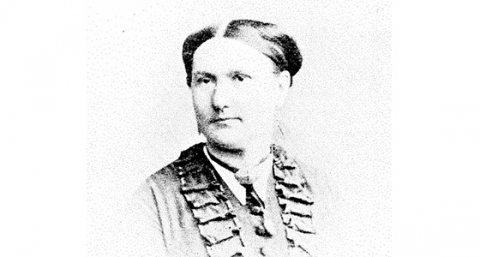UK Clean-Up Hikes For Earth Week
19.04.2024The North Face have announced an Earth Week initiative to clean-up hiking routes in England and Walkes, this coming Saturday...
Lucy Walker was a trailblazer in female Alpinism.
In 1871, exactly 150 years ago, the British mountaineer Lucy Walker became the first woman to reach the top of the iconic Matterhorn in Switzerland. What marks a milestone not only in the history of British but global mountaineering, has also given women in mountain sports a face. This summer, in the light of this anniversary, Switzerland Tourism is working to motivate women to pursue and achieve their goals in mountain climbing.
On 22 July 1871, only six years after her countryman Edward Whymper, Lucy Walker (1836-1916) became the first woman to reach the top of the Matterhorn, the most sought-after prize in mountaineering. She won the race over her rival Meta Brevoort from the USA. Climbing the peak while wearing a long flannel skirt – appropriate for a Victorian lady at that time – did not hinder Lucy Walker in achieving her goal and she became a pioneer in female alpinism. The ascent of the Matterhorn by the first woman was considered a milestone in Alpine history.
In July 2021, Switzerland Tourism and Swiss outdoor brand Mammut will support a British outdoor adventurer to add a milestone to her climbing and mountaineering career by tackling the iconic 4,478m peak. Olivia Jane spent most of her childhood in Zermatt, the same village that was a base for Lucy Walker’s Matterhorn ascent in 1871. Her family bred St. Bernard dogs to support the mountain rescue teams in the area which is where her passion for mountains and adventure grew. This summer she will follow her childhood dream and step into the shoes of Lucy Walker and share her training and preparations in a personal diary.
‘I hope I am able to motivate other women to pursue their goals when it comes to similar adventures’, says Olivia Jane.
A lack of female role models might prevent other women from starting or even thinking about mountain climbing. The 100% Women Peak Challenge – an initiative by Switzerland Tourism together with its partners, the Swiss Alpine Club (SAC), the Swiss Mountain Guide Association and the Swiss outdoor brand Mammut – challenges women-only teams to ascend the 48 highest peaks in the Swiss Alps this summer. The challenge will run until 8 September 2021 and interested participants can profit from the professional advice of the involved expert partners or participate in guided climbs.

This year, the historical British Alpine Club is celebrating Lucy Walker as well as the American climber Meta Brevoort, by assembling a group of approximately 30 female alpinists who will, in different formations, ascend the iconic Matterhorn and also the Weisshorn, Bietschhorn and Dent Blanche. The project ‘Women Rise Up‘ honours Walker’s accomplishment and aims to offer fresh inspiration to modern female climbers.
The women who shaped male dominated Alpinism
For the most part, it was men who shaped the history of alpinism – but not exclusively. As far back as the 19th century, there have been women achieving top performances in the Alps. And often under difficult conditions (wearing skirts or harem trousers), without social acceptance, excluded from alpine clubs and limited opportunities to report on their experiences in public. The first half of the 19th century saw an upsurge in mountaineering as Alpine tourism became increasingly developed. In particular, upper-class Englishmen travelled the Swiss Alps with the goal of achieving a first ascent.
Around 1860, the golden age of alpinism began, with more and more demanding Alpine peaks being climbed. The era reached its high point in 1865 with the first ascent of the Matterhorn by Edward Whymper. In 1884, Elizabeth Burnaby Main Le Blond, a British mountaineer, undertook more than 130 grand tours from 1881 onwards, including 26 first ascents and 11 first winter ascents. In 1907, she was the driving force behind the founding of the British Ladies Alpine Club and became its first president. The Swiss Alpine Club (SAC) was founded in 1863 (as the third Alpine Club in Europe, after the one in England that was founded in 1857). In 1907, after long discussions, women were actively excluded from the SAC, which led to the founding of the Swiss Women’s Alpine Club in 1918. It was not until 1980 that the Swiss Alpine Club merged with the Swiss Women’s Alpine Club.
Photo Credits @Alpine Club
Enjoyed this article? click here to get more from us
The North Face have announced an Earth Week initiative to clean-up hiking routes in England and Walkes, this coming Saturday...
In Italy’s Alta Badia, when the inhabitants of this South Tyrolean valley talk about sustainability, they use terms such as...
Get ready for an unforgettable journey into the heart of the Swiss Alps as Verbier invites you to discover a...
Although best known for its beaches, seeing the of Mallorca’s stunning landscapes on horseback gives riders the chance to immerse...